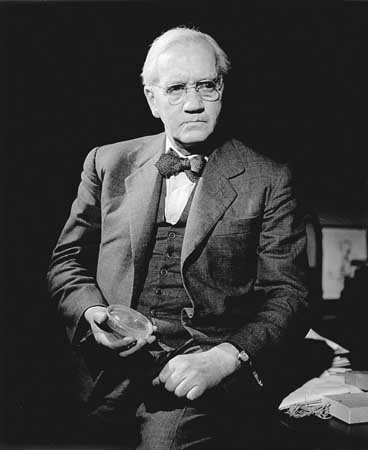ALEXANDER FLEMING MEMORIAL AWARD
Sir Alexander Fleming FRS FRSE FRCS (6 August 1881 – 11 March 1955) was a Scottish physician and microbiologist, best known for discovering the enzyme lysozyme and the world's first broadly effective antibiotic substance which he named penicillin. He discovered lysozyme from his nasal discharge in 1922, and along with it a bacterium he named Micrococcus Lysodeikticus, later renamed Micrococcus luteus. His discovery of what is later named benzylpenicillin (or penicillin G) from the mould Penicillium rubens in 1928, is described as the "single greatest victory ever achieved over disease." For this discovery he shared the Nobel Prize in Physiology or Medicine in 1945 with Howard Florey and Ernst Boris Chain.
Fleming was knighted for his scientific achievements in 1944. In 1999, he was named in Time magazine's list of the 100 Most Important People of the 20th century. In 2002, he was chosen in the BBC's television poll for determining the 100 Greatest Britons, and in 2009, he was also voted third "greatest Scot" in an opinion poll conducted by STV, behind only Robert Burns and William Wallace.
During World War I, Fleming with Leonard Colebrook and Sir Almroth Wright joined the war efforts and practically moved the entire Inoculation Department of St Mary's to the British military hospital at Boulogne-sur-Mer. Serving as Temporary Lieutenant of the Royal Army Medical Corps, he witnessed the death of many soldiers from sepsis resulting from infected wounds. Antiseptics, which were used at the time to treat infected wounds, he observed, often worsened the injuries. In an article published in the medical journal The Lancet in 1917, he described an ingenious experiment, which he was able to conduct as a result of his own glass blowing skills, in which he explained why antiseptics were killing more soldiers than infection itself during the war. Antiseptics worked well on the surface, but deep wounds tended to shelter anaerobic bacteria from the antiseptic agent, and antiseptics seemed to remove beneficial agents produced that protected the patients in these cases at least as well as they removed bacteria, and did nothing to remove the bacteria that were out of reach. Wright strongly supported Fleming's findings, but despite this, most army physicians over the course of the war continued to use antiseptics even in cases where this worsened the condition of the patients.
At St Mary's Hospital, Fleming continued his investigations into bacteria culture and antibacterial substances. As his research scholar at the time V.D. Allison recalled, Fleming was not a tidy researcher and usually expected unusual bacterial growths in his culture plates. Fleming had tease Allison of his "excessive tidiness in the laboratory," and Allison rightly attributed such untidiness as the success of Fleming's experiments, and said, "[If] he had been as tidy as he thought I was, he would not have made his two great discoveries.
Fleming's discovery of penicillin changed the world of modern medicine by introducing the age of useful antibiotics; penicillin has saved, and is still saving, millions of people around the world.
With all great respect, we wish to dedicate this 6th World Congress on Drug Discovery and Development - 2022 to Late. Alexander Fleming for his discovery towards varioud life saving drugs and being the force behind our knowledge today.
Eligibility
- Senior Scientists or Researchses e.g. Senior Faculty, Dean, Senior Scientists) are the focus of this event.
- The topic must fit into scientific sessions of the conference.
- Each individual participant is allowed to submit only one paper (as first author or co-author).
- All authors should have senior position or faculty position.
- Participants should be above the age of 40 years.
- All submissions must be in English.
- Actively distribute information and promote the benefits of education and career matters.
Criteria for Selection
- Showcase your research through oral presentations and its impact to the Panel Member.
- Impact of the Research Work.
- Importance of the Research work to the socity.
- New Innovation in the Research Work
Awards & Rewards
- The Best Researcher will be awarded with Alexander Fleming Memorial Award at the end of the conference.
For Nomination Kindly write a mail to the Conference Secretariat at
[email protected] and kindly attached the below mentioned documents.
- Brief CV(Kindly mention atleast 2 reference)
- Abstact for his/her speeh during the summit.
- Last 2 Publication Research Work
- 1 Copy of HD Photograph
